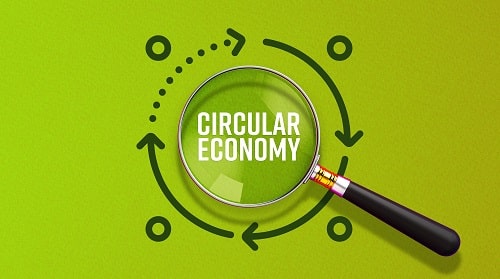From March 2025, many businesses in England will have to begin separating their recyclable and food waste from general waste prior to collection, but the changes will bring wider business benefits, such as reduced waste disposal costs and improved sustainability credentials.
Features
Why changes to recycling legislation in England are an opportunity, not a burden
In just a few months, new ‘Simpler Recycling’ rules will come into force for businesses in England. According to a new survey, nearly a quarter of small to medium-sized businesses (SMEs) aren’t even aware of the upcoming legislation, with 81 per cent expressing concerns about its impact.
 Photograph: Newell Brands
Photograph: Newell Brands
The survey of 300 SMEs, conducted by international waste and recycling manufacturer Rubbermaid Commercial Products (RCP) through Censuswide, showed that just 61 per cent of SMEs across various sectors – hospitality, education, healthcare, manufacturing and utilities, retail, and travel and transport – are currently separating any waste for recycling, meaning many have significant changes to make ahead of the March deadline.
However, RCP believes companies should see the changes in commercial recycling as an opportunity to implement better recycling practices that will have wider business benefits, such as helping them to cut costs, increase recycling efficiency and improve their sustainability.
The new rules explained
From 31 March 2025, the new legislation, being brought in under the Environment Act 2021, will require businesses in England with 10 or more employees to separate dry mixed recyclables and food waste from their general waste, prior to collection from their premises by their waste contractor.
Under the new legislation, it will be the responsibility of the business to have multi-stream recycling in place, so waste is separated at source. What’s more, with the possibility of hefty fines and even civil sanctions, non-compliance could be costly.
What could Simpler Recycling mean for business?
With fewer than two-thirds of the SMEs we surveyed currently separating any of their waste for recycling, and budgets and resources tight, it’s understandable that the majority are concerned about the impact the legislation is going to have on their business, including worries about the resource needed to make changes, the impact on their reputation, the limited timescales, and the cost to implement.
The good news? Recycling waste is actually cheaper than sending it to landfill, meaning that better recycling can actually help businesses to save money on waste management. And with landfill taxes set to rise by 20 per cent in April 2025¹, recycling more waste is only going to become more beneficial in future.
As well as internal pressure from stakeholders, businesses are increasingly facing demands from consumers to be ‘greener’. In fact, over half feel businesses aren’t doing enough on climate change, according to research from RCP in 2022². Demonstrating your dedication to more sustainable practices by implementing a robust recycling system will allow you to set and reach tangible targets and give your overall sustainability credentials a boost.
A focus on food waste
One of the biggest changes for all businesses will be the rules surrounding the separation of food waste for recycling. The legislation requires businesses to separate food waste and they will not be allowed to use food waste disposal equipment or other forms of food waste treatment equipment such as macerators and dewatering or enzyme digesters³.
Although the rules apply to all businesses, it’s clear that hospitality businesses are likely to be some of the most affected. While the survey found that 88 per cent are already separating some waste for recycling, as few as 34 per cent are currently separating their food waste for recycling.
Real-world results
Businesses that have already implemented efficient multi-stream recycling within their venues are already reaping the rewards of reduced costs, meeting customer expectations and improving their sustainability.
Workplace recycling legislation was introduced in Wales earlier in 2024, and with legislation on the horizon and a desire to improve recycling practices across its sites, Torfaen Leisure Trust (TLT) was looking to get ahead of the rule changes. An in-depth ‘waste walk’ of its sites found high potential for waste separation both front and back of house, identified missed opportunities to capture recyclable relevant waste, and a lack of standardisation, consistency of messaging and education in waste separation, ultimately leading to poor results.
 Adriana Olaya Rodriguez is communications and sustainability manager at Newell Brands. Photograph: Newell Brands
Adriana Olaya Rodriguez is communications and sustainability manager at Newell Brands. Photograph: Newell Brands
The solution? The implementation of a multi-stream recycling system across five of its sites alongside staff training and education. The results speak for themselves, as TLT is now set to improve its recycling rate by an estimated 32 per cent and cut waste management costs by 39 per cent.
Compliance could see businesses across England win big both in terms of sustainability and commerciality. It should be seen not as a hindrance but as a golden opportunity for organisations to implement better recycling that will, in the long run, pay dividends.
This is what good recycling looks like
To make the most of the opportunity the new legislation brings, it’s important for businesses to understand recycling best practice and to see it as more than a box-ticking exercise.
Value visibility
Can your bins be seen? Reduce cross-contamination and boost recycling efficiency by making recycling as easy as possible both for your customers and your employees. Clear and colour-coded signage with familiar symbols will help people quickly identify what type of waste can be recycled and where.
Different areas need different bins
From capturing high volumes in busy back of house zones to tight spaces in kitchens and food preparation areas, choosing the right recycling station for each area means you can effectively separate your recyclable waste without interfering with day-to-day operations.
Go modular
Your business’s needs will vary over time, and you may even need to introduce and take away streams. Investing in modular recycling solutions over single units housing multiple bins will give you the flexibility to make changes without having to spend your budget on new systems. Modular containers are also typically easier to maintain and clean compared with ‘all-in-one’ systems.
Invest in durability
Save on the unnecessary wasted time, cost and environmental resources associated with the frequent replacement of lower quality products by prioritising durable containers that will stand the test of time. Furthermore, opting for manufacturers who can provide long warranties will give you added peace of mind.
Adriana Olaya Rodriguez is communications and sustainability manager at Newell Brands.
Your guide to the legislation
RCP has created a simple guide to help businesses understand their responsibilities under the new legislation. You can download it here.
About the survey
The research was conducted by Censuswide, among a sample of 250 SME decision makers and 300 hospitality decision-makers with responsibility for waste and recycling management in England (18+). The data was collected between 25/07/2024 and 31/07/2024. Censuswide abides by and employs members of the Market Research Society and follows the MRS code of conduct and ESOMAR principles. Censuswide is also a member of the British Polling Council.
Sources
- Landfill Tax rates for 2024 to 2025, HM Revenue & Customs, tinyurl.com/2nttbfwk
- RCP: Why Product Longevity is a Powerful First Step to Improving Commercial Sustainability, 2022, tinyurl.com/eurkwhxj
- Environment Act 2021, tinyurl.com/3maxat38
FEATURES

How to build circular economy business models
By Chloe Miller, CC Consulting on 07 April 2025
Widespread adoption of a circular economy model by business would ensure greater environmental and economic value is extracted and retained from raw materials and products, while simultaneously reducing carbon emissions, protecting the environment and boosting business efficiency and reputation.

What does the first year on an accelerated net zero path have in store for UK businesses?
By Team Energy on 07 April 2025
The UK is halfway to net zero by 2050 and on a new, sped-up net zero pathway. In light of this, Graham Paul, sales, marketing & client services director at TEAM Energy, speaks to TEAM Energy’s efficiency and carbon reduction experts about the future of energy efficiency and net zero in the UK.

Aligning organisational culture with sustainability: a win, win for the environment and business
By Dr Keith Whitehead, British Safety Council on 04 April 2025
The culture of an organisation is crucial in determining how successfully it implements, integrates and achieves its sustainability and environmental goals and practices. However, there are a number of simple ways of ensuring a positive organisational culture where everyone is fully committed to achieving excellent sustainability performance.



